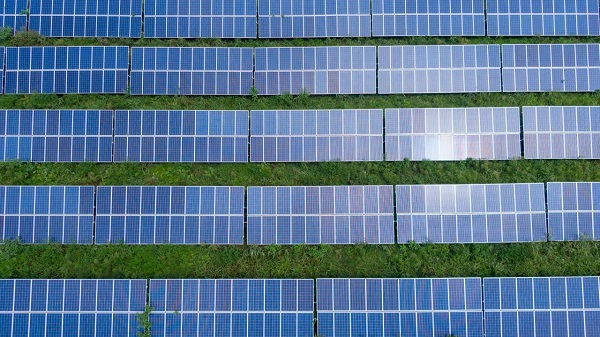Energy
Solar’s Dirty Secret: Expensive and Unfit for the Grid

From the Frontier Centre for Public Policy
By Ian Madsen
To store twelve hours worth of the 1.6 TW total installed global solar power capacity would cost about 12.9 trillion Canadian dollars
Solar energy’s promise of a green, abundant future is captivating—but beneath the shiny panels lies a story of unreliability, hidden costs, and grid instability.
Green enthusiasts endorse solar energy to reduce carbon dioxide (CO2) emissions from traditional energy sources such as coal, oil, and natural gas. The source of solar power, the sun, is free, abundant, and always available somewhere. However, these claims are misleading. Solar energy is costly and unreliable in ways its proponents commonly disguise. If adopted extensively, solar energy will generally make energy and electric power grids more unreliable and expensive.
The solar industry has burgeoned remarkably, with an estimated average compound annual growth rate (CAGR) of about 39 percent from 2021 to 2024. Earlier this century, the growth rate was even faster. As a result, global installed solar capacity has reached 1.6 terawatts (TW), according to the U.S. Energy Department. This capacity is theoretically sufficient to power a billion homes at 1.5 kilowatts per home. However, the term “theoretically” poses a significant challenge. Solar power, without affordable energy storage solutions, is only available during daylight hours.
The minimum amount of storage required to make global solar power truly “dispatchable”—i.e., independent of other backup energy sources—would be twelve hours of storage. Options include batteries, pumped hydro, compressed air, or other technologies. Since batteries are today’s standard method, the following calculation estimates the cost of the minimum amount of battery storage to ensure reliable solar power.
Twelve hours per day multiplied by 1.6 terawatts and dividing the result by one kilowatt-hour (kWh), we arrive at a final requirement of 19.2 billion kWh of storage. According to a meta-study by the National Renewable Energy Lab, the utility-grade cost of battery storage is C$670.99 per kWh.
To store twelve hours worth of the 1.6 TW total installed global solar power capacity would cost about 12.9 trillion Canadian dollars; a safer twenty-four hours’ storage would be double that. Total storage available in 2023 was, the International Energy Agency notes, approximately two hundred and sixty gigawatts (GW) of power – a tiny fraction of power production of 3.2 million GW in 2022, using figures from Statista.
No firms or governments can have the necessary storage to make solar viable even if the entire globe was involved, as the total global GDP was about C$148 trillion in 2023, according to World Bank figures. That is not solar’s only problem. The most harmful effect is how it undermines power grids. The misleading, ‘levelized’ near-zero cost undercuts traditional, reliable on-demand energy sources such as coal, natural gas and nuclear power.
Importantly, high solar and wind power output can make prices turn negative, as an Institute for Energy Research article noted, but can swiftly revert to high prices when winds calm or the sun sets, as the fixed costs of traditional power plants are spread over lower production. Baseload traditional energy sources are essential because the frequent unavailability of renewables can be dangerous. Consequently, overall costs for customers are higher when renewables are included in the energy mix. Solar mandates in California made its power supply wildly erratic.
Without affordable energy storage, solar is a seductive illusion; its unchecked adoption risks turning power grids into unreliable, costly experiments at the expense of energy stability.
Ian Madsen is the Senior Policy Analyst at the Frontier Centre for Public Policy.
2025 Federal Election
MORE OF THE SAME: Mark Carney Admits He Will Not Repeal the Liberal’s Bill C-69 – The ‘No Pipelines’ Bill

From EnergyNow.Ca
Mark Carney on Tuesday explicitly stated the Liberals will not repeal their controversial Bill C-69, legislation that prevents new pipelines being built.
Carney has been campaigning on boosting the economy and the “need to act forcefully” against President Donald Trump and his tariffs by harvesting Canada’s wealth of natural resources — until it all fell flat around him when he admitted he actually had no intention to build pipelines at all.
When a reporter asked Carney how he plans to maintain Bill C-69 while simultaneously building infrastructure in Canada, Carney replied, “we do not plan to repeal Bill C-69.”
“What we have said, formally at a First Ministers meeting, is that we will move for projects of national interest, to remove duplication in terms of environmental assessments and other approvals, and we will follow the principle of ‘one project, one approval,’ to move forward from that.”
“What’s essential is to work at this time of crisis, to come together as a nation, all levels of government, to focus on those projects that are going to make material differences to our country, to Canadian workers, to our future.”
“The federal government is looking to lead with that, by saying we will accept provincial environmental assessments, for example clean energy projects or conventional energy projects, there’s many others that could be there.”
“We will always ensure these projects move forward in partnership with First Nations.”
Tory leader Pierre Poilievre was quick to respond to Carney’s admission that he has no intention to build new pipelines. “This Liberal law blocked BILLIONS of dollars of investment in oil & gas projects, pipelines, LNG plants, mines, and so much more — all of which would create powerful paychecks for our people,” wrote Poilievre on X.
“A fourth Liberal term will block even more and keep us reliant on the US,” he wrote, urging people to vote Conservative.
Alberta
Energy sector will fuel Alberta economy and Canada’s exports for many years to come

From the Fraser Institute
By any measure, Alberta is an energy powerhouse—within Canada, but also on a global scale. In 2023, it produced 85 per cent of Canada’s oil and three-fifths of the country’s natural gas. Most of Canada’s oil reserves are in Alberta, along with a majority of natural gas reserves. Alberta is the beating heart of the Canadian energy economy. And energy, in turn, accounts for one-quarter of Canada’s international exports.
Consider some key facts about the province’s energy landscape, as noted in the Alberta Energy Regulator’s (AER) 2023 annual report. Oil and natural gas production continued to rise (on a volume basis) in 2023, on the heels of steady increases over the preceding half decade. However, the dollar value of Alberta’s oil and gas production fell in 2023, as the surging prices recorded in 2022 following Russia’s invasion of Ukraine retreated. Capital spending in the province’s energy sector reached $30 billion in 2023, making it the leading driver of private-sector investment. And completion of the Trans Mountain pipeline expansion project has opened new offshore export avenues for Canada’s oil industry and should boost Alberta’s energy production and exports going forward.
In a world striving to address climate change, Alberta’s hydrocarbon-heavy energy sector faces challenges. At some point, the world may start to consume less oil and, later, less natural gas (in absolute terms). But such “peak” consumption hasn’t arrived yet, nor does it appear imminent. While the demand for certain refined petroleum products is trending down in some advanced economies, particularly in Europe, we should take a broader global perspective when assessing energy demand and supply trends.
Looking at the worldwide picture, Goldman Sachs’ 2024 global energy forecast predicts that “oil usage will increase through 2034” thanks to strong demand in emerging markets and growing production of petrochemicals that depend on oil as the principal feedstock. Global demand for natural gas (including LNG) will also continue to increase, particularly since natural gas is the least carbon-intensive fossil fuel and more of it is being traded in the form of liquefied natural gas (LNG).
Against this backdrop, there are reasons to be optimistic about the prospects for Alberta’s energy sector, particularly if the federal government dials back some of the economically destructive energy and climate policies adopted by the last government. According to the AER’s “base case” forecast, overall energy output will expand over the next 10 years. Oilsands output is projected to grow modestly; natural gas production will also rise, in part due to greater demand for Alberta’s upstream gas from LNG operators in British Columbia.
The AER’s forecast also points to a positive trajectory for capital spending across the province’s energy sector. The agency sees annual investment rising from almost $30 billion to $40 billion by 2033. Most of this takes place in the oil and gas industry, but “emerging” energy resources and projects aimed at climate mitigation are expected to represent a bigger slice of energy-related capital spending going forward.
Like many other oil and gas producing jurisdictions, Alberta must navigate the bumpy journey to a lower-carbon future. But the world is set to remain dependent on fossil fuels for decades to come. This suggests the energy sector will continue to underpin not only the Alberta economy but also Canada’s export portfolio for the foreseeable future.
-

 2025 Federal Election2 days ago
2025 Federal Election2 days agoPoilievre, Conservatives receive election endorsement from large Canadian trade union
-

 2025 Federal Election2 days ago
2025 Federal Election2 days agoRCMP Confirms It Is ‘Looking Into’ Alleged Foreign Threat Following Liberal Candidate Paul Chiang Comments
-

 2025 Federal Election22 hours ago
2025 Federal Election22 hours agoMark Carney refuses to clarify 2022 remarks accusing the Freedom Convoy of ‘sedition’
-

 2025 Federal Election2 days ago
2025 Federal Election2 days agoLondon-Based Human Rights Group Urges RCMP to Investigate Liberal MP for Possible Counselling of Kidnapping
-

 2025 Federal Election1 day ago
2025 Federal Election1 day agoPM Carney’s Candidate Paul Chiang Steps Down After RCMP Confirms Probe Into “Bounty” Comments
-

 Business2 days ago
Business2 days agoBiden’s Greenhouse Gas ‘Greendoggle’ Slush Fund Is Unraveling
-

 2025 Federal Election1 day ago
2025 Federal Election1 day agoLiberal MP Paul Chiang Resigns Without Naming the Real Threat—The CCP
-

 Censorship Industrial Complex2 days ago
Censorship Industrial Complex2 days agoFrance condemned for barring populist leader Marine Le Pen from 2027 election




